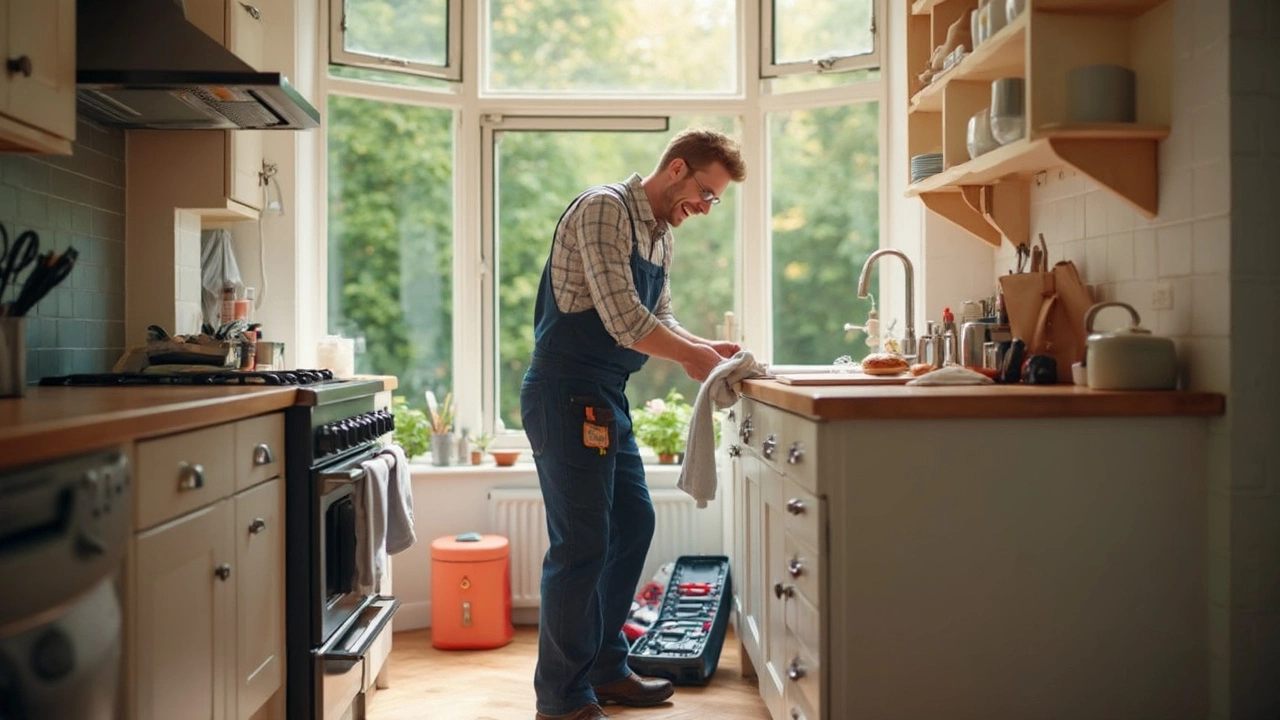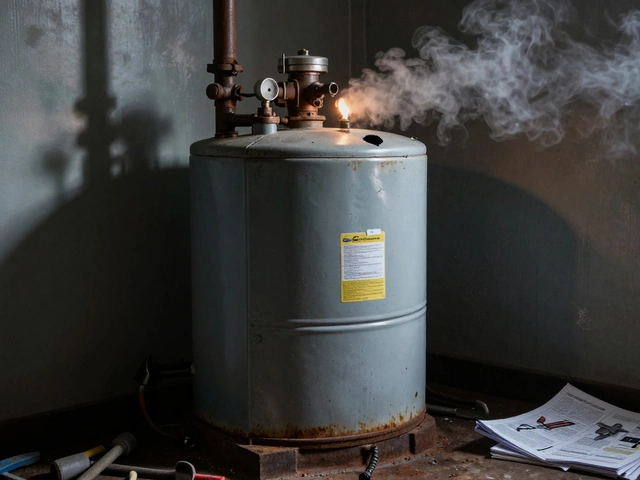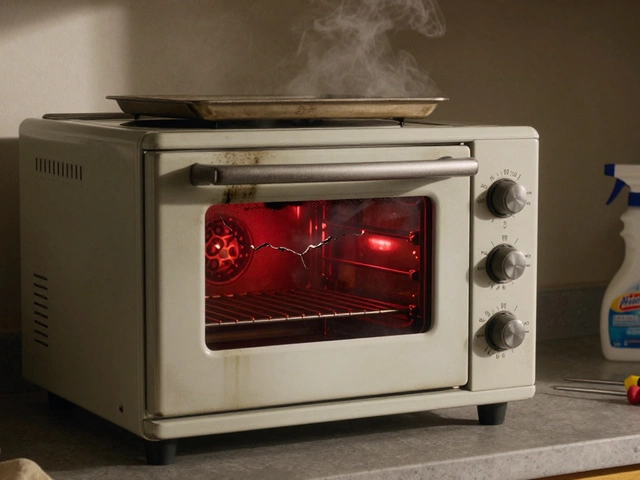Appliance technicians are the unsung heroes who keep our hustle running smoothly. Ever wonder who to call when your fridge starts sounding like an opera singer or a washing machine decides it's time to leak all over the floor? That's right, the appliance technician. They're the folks you count on to make sure you don't end up hand-washing laundry or resorting to drying dishes the old-fashioned way.
Their job is fascinating because it's both predictable and full of surprises. They deal with the expected wear and tear of appliances but also some bizarre malfunctions that would stump most of us. Their toolkit isn't just filled with screwdrivers and wrenches; it's packed with the know-how to diagnose and tackle a myriad of issues right on the spot.
- What Does an Appliance Technician Do?
- Training and Skills Required
- Common Issues and Solutions
- Maintenance Tips for Homeowners
What Does an Appliance Technician Do?
So, what does an appliance technician really do? These pros are the backbone of our home comforts, handling a variety of tasks from repairs to installations. They don't just fix what's broken; they prevent future breakdowns by keeping things running smoothly. Let’s break down their day-to-day work.
Diagnosing and Repairing
First, they start with diagnosing issues in all types of home appliances. Whether it’s a fridge that's lost its chill or a dryer refusing to spin, these technicians have the skills to figure out what's going on. They use modern tools and tech, sometimes as simple as a multimeter or as complex as diagnostic software, to pinpoint issues quickly and accurately.
Routine Maintenance
Besides repair work, they handle routine maintenance tasks. Regular checkups avert big problems down the line. For instance, keeping coils clean in a refrigerator can save you from unexpected breakdowns. Similarly, cleaning the lint trap in dryers isn't just a chore—it's a safety measure that these technicians reinforce.
Installation of New Appliances
Technicians also install new appliances, making sure they're set up right from the get-go. This includes checking connections, ensuring levels, and configuring settings for optimal efficiency. An appliance technician ensures everything is running as it should to maximize the lifespan of the machine.
Consultation and Advice
These experts also lend advice on whether it’s more cost-effective to repair or replace an outdated appliance. Their experience helps homeowners make informed decisions.
Broadly speaking, an appliance technician's role is multifaceted, mixing hands-on technical work with customer service and consultation. They not only repair but educate, allowing you to get the most out of your home appliances.
Training and Skills Required
Becoming an appliance technician isn't just about fixing broken stuff; it's about understanding how a wide range of gadgets work and what makes them tick—or sometimes, what makes them stop ticking. This field requires a mix of technical know-how and hands-on practice. While some folks pick it up naturally through years of DIY repairs, most technicians go the formal route with a combination of on-the-job training and certified courses.
Formal Training
Most technicians kick-start their career by enrolling in vocational schools or community colleges offering specialized programs in appliance repair. These programs typically cover the ins and outs of popular household devices, along with the mechanical and electrical systems that keep them running. The courses are crafted to ensure you can handle everything from a simple dryer vent cleaning to more complex electronics within an oven.
According to the National Appliance Service Technician Certification (NASTeC), completing a trusted training program not only makes one adept at various repairs but significantly boosts employability. As a senior trainer at the American River College remarked,
"The skills acquired through these programs are directly applicable, ensuring technicians can confidently address issues as they arise."
Skills That Make a Pro
Talking about skills, there’s a laundry list of things a good appliance tech should know:
- Diagnostic Skills: Spotting the problem is half the battle. Technicians are trained to quickly determine what's wrong, even when the symptoms are unclear.
- Mechanical Aptitude: Many appliances have complicated moving parts. Knowing how to navigate these without causing further damage is crucial.
- Electrical Knowledge: Given that many appliances are electrical, an understanding of wiring and circuits is key.
- Customer Service: Technicians often work directly with customers. Being able to communicate effectively, set expectations, and handle customer concerns is vital.
Certification and Continuing Education
After initial training, many techs pursue certification to validate their skills. It’s a smart move, as certifications from reputable organizations like the NASTeC can give them a leg up in job markets. But it doesn't stop there.
Technology changes, and so do appliances. Staying up-to-date with the latest tech advancements and models is part and parcel of the job here. Many technicians take annual courses to refresh their knowledge or specialize in newer appliance models.
In short, mastering the world of appliance service is about combining what you learn in the classroom with real-world experiences. It’s a journey of constant learning and adaptation, ensuring folks like you and me don’t have to sweat the small stuff when our favorite appliances go on the fritz.

Common Issues and Solutions
When it comes to appliance woes, an appliance technician sees it all. Some problems are perennial favorites, popping up in households everywhere.
Fridge Not Cooling
A refrigerator not doing its job is a common headache. Sometimes, it's a simple issue like a misaligned door seal allowing warm air in. Check and realign the seal to ensure a snug fit. Another culprit could be dusty coils. Regularly vacuuming the coils can boost efficiency.
If these quick fixes don't work, it might be the thermostat or compressor. A pro might tell you, as Mark Davidson, a veteran tech, said,
"Don't ignore strange sounds. They might signal a compressor struggling and catching it early saves a hefty bill later."
Washing Machine Leaks
Leaky washers often lead to panic. Most times, it's the hoses or the door seal. Inspect for cracks and replace if necessary. Ensure that the load isn't too heavy as this can strain the machine, causing imbalance and eventually leaks.
Oven Not Heating Evenly
If your oven's having hot and cold spots, uneven baking is probably driving you nuts. Faulty heating elements often cause this. An appliance technician can test elements for continuity and replace them if needed. Also, ensure the oven’s thermostat is calibrated.
Solutions
- Always start by checking power sources and ensure all appliances are plugged in properly.
- Use appliance manuals for basic troubleshooting before calling a professional.
- Maintain regular cleaning schedules to keep appliances dust-free and efficient.
| Issue | Possible Cause | Quick Fix |
|---|---|---|
| Fridge Not Cooling | Door seal misaligned, dusty coils | Realign seal, clean coils |
| Washing Machine Leaks | Crack in hose, overloaded machine | Inspect hose, reduce load |
| Oven Not Heating Evenly | Faulty heating element | Test and replace element |
Maintenance Tips for Homeowners
Keeping your home appliances in top shape doesn't have to be rocket science. With a little regular attention, you can extend the life of these trusty machines and save on repair bills. Whether it's the fridge or the dishwasher, here are some down-to-earth tips any homeowner can follow.
Regular Cleaning
First off, clean your appliances regularly. It sounds simple, but dust, grease, and grime are your appliances' worst enemies.
- Refrigerator: Vacuum the coils at the back every few months to keep it operating efficiently. Also, clean the door seals and check for any cracks.
- Dishwasher: Start by cleaning the filter and spray arm to ensure water sprays evenly.
Check for Leaks
Leaks can cause major headaches. Regularly inspect hoses for signs of wear and tear.
- Washing Machine: Look for cracks in hoses and replace them every five years, regardless of appearance. Consider using stainless steel braided hoses for durability.
- Dishwasher: Make sure the door seal is clean and undamaged. A small tear can lead to a bigger problem down the line.
Use Appliances Properly
Believe it or not, how you use your appliances affects their lifespan. Avoid overloading machines, which strains their motors.
- Washing Machine: Follow the manufacturer's load guidelines. Overstuffing might save a trip, but it can wear out the drum and, ultimately, the motor.
- Oven: Using the correct cookware size is key. Oversized pans block airflow and cause uneven cooking.
Annual Inspections
Not everything is meant to be a DIY project. Have a professional technician do a yearly checkup of key appliances like AC units and refrigerators. This proactive measure can catch small issues before they turn into costly repairs.
By sticking to these simple steps, you're not just helping your appliances but also your peace of mind. Regular maintenance means fewer surprise breakdowns and a healthier budget!




